 |
Convert OGV to BMP Sequence
|
The BMP file format, also known as bitmap image file or
Device Independent Bitmap (DIB) file format or simply a bitmap, is a raster graphics
image file format used to store bitmap digital images, independently of the display
device (such as a graphics adapter), especially on Microsoft Windows and OS/2
operating systems. The BMP is stored uncompressed; so it's a lossless image format,
but file size is very big.
OGV to BMP Converter Software converts OGV to BMP sequence files.
With the software, you could get every frame image of OGV in BMP format. The
converter software also supports other output image formats such as JPG,
PNG, and TIFF. You can convert only a part of OGV to BMP instead of the entire
file. And you can set how many frames per second to be extracted with the software.
The output BMP files look something like this.
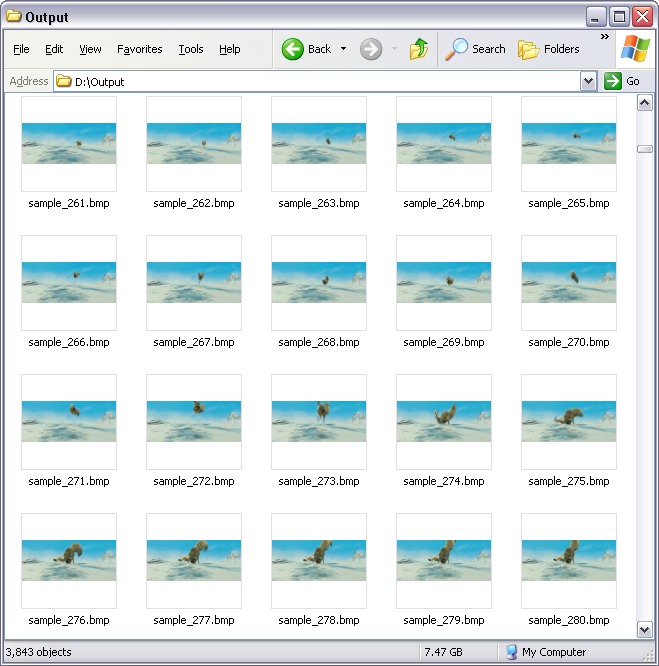
The software also supports other formats and portable devices such as PPM image sequence, AU, Windows Phone, SPX (Speex), MOV, SWF, Android Tablet,
etc. The software could convert TS to AAC, H264 to AU, TS to OGV, M2TS to JPG image sequence, M2TS to WAV, and so on.
OGV to BMP Software supports batch conversion and, is compatible
with Windows 10/8/7/Vista/XP/2000.

What is OGV?
The OGV and OGM file extensions correspond to the Ogg Vorbis Video File
format. OGGs use specialized Ogg Vorbis encoding techniques to create high-resolution
video files in small containers. Xiph.Org, the developers of the OGV format,
provide a DirectShow codec pack that enables software developers to include
support for OGV files in both open-source and commercial applications.
Theora is a free and open video compression format from the Xiph.org Foundation.
The Theora reference implementation libtheora spent several years in alpha
and beta status. The first alpha version was released on 2002-09-25. The
first beta version was released on 22 September 2007. The first stable
release of libtheora was made in November 2008. Work then focused on improving
the codec performance in the "Thusnelda" branch, which was released
as version 1.1 in September 2009 as the second stable libtheora release.
This release brought some technical improvements and new features, e.g.
the new rate control module and the new two-pass rate control. Theora is
a variable-bitrate, DCT-based video compression scheme. Like most common
video codecs, Theora also uses chroma subsampling, block-based motion compensation
and an 8-by-8 DCT block. Pixels are grouped into various structures, namely
super blocks, blocks and macroblocks. NOTE: Audio files that use the Ogg
container are called Ogg Vorbis files, where "Vorbis" refers
to the specific compression algorithm used for the audio data. The term
"Vorbis" does not apply to Ogg video content. Videos encoded
with any version of the libtheora since the alpha3 will be compatible with
any future player.
What is BMP?
The .bmp file extension is given to raster image files, also known as bitmap
image files. These non-compressed image files contain a file header and
the pixels of the associated bitmap. Indexed color images may be compressed
with 4-bit or 8-bit RLE or Huffman 1D algorithm. OS/2 BITMAPCOREHEADER2
24bpp images may be compressed with the 24-bit RLE algorithm. The 16bpp
and 32bpp images are always stored uncompressed. Note that images in all
color depths can be stored without compression if so desired. The JPEG
and GIF formats are also bitmaps, but use image compression algorithms
that can significantly decrease their file size. For this reason, JPEG
and GIF images are used on the Web, while BMP images are often used for
printable images. bitmap image files are typically much larger than image
file formats compressed with other algorithms, for the same image. For
example, the 1058*1058 Wikipedia logo, which occupies about 271 kB in the
lossless PNG format, takes about 3358 kB as a 24bpp BMP image file. Uncompressed
formats are generally unsuitable for transferring images on the internet
or other slow or capacity-limited media. The integers in a BMP file are
stored in little endian format, another name for the Intel format. This
is because the BMP format was actually created for computers with Intel
processors. The new extended headers can be used with some GDI functions
instead of the older ones, providing more functionality. Since the GDI
supports a function for loading bitmap files, typical Windows applications
use that functionality. One consequence of this is that for such applications,
the BMP formats that they support match the formats supported by the Windows
version being run.
How to Convert OGV to BMP Sequence?
- Free Download OGV to BMP Conversion
Software
- Install the Program by Step-by-step Instructions
- Launch OGV to BMP Software
- Choose OGV Files

Click "Add Files" to choose OGV files.
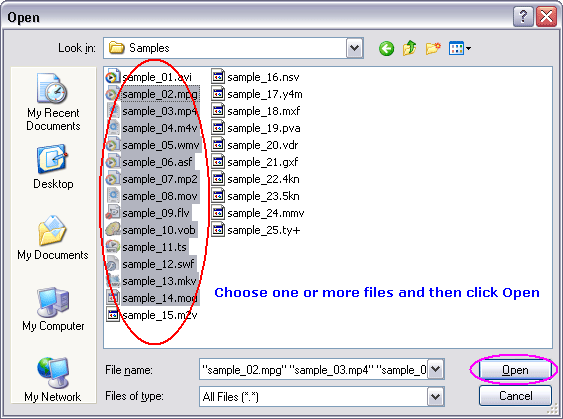
Choose one or more OGV files you want to convert and then click Open.
OGV to BMP Software will open OGV files and get file information
of the file such as width, height, frame rate, video bit rate, audio sample rate,
audio bit rate, audio channels, and then display the information of OGV file
at conversion list.
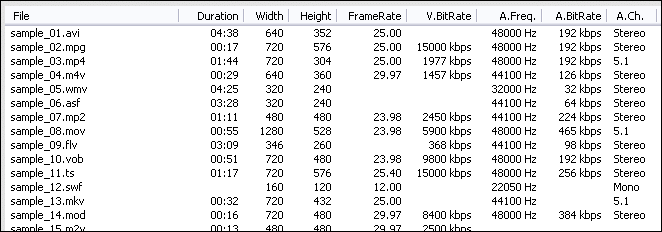
- Choose Output Format
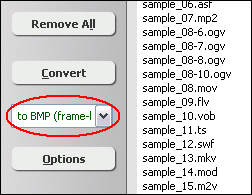
Click on combo-box of output format and then choose "to BMP (image sequence)".
- [Optional, for advanced user]
Set BMP Encoding Parameters
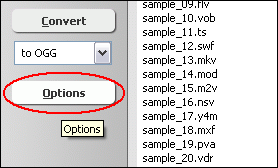
If you want to change BMP encoding parameters such as frame rate, video size,
aspect ratio, and so on, please click "Options".
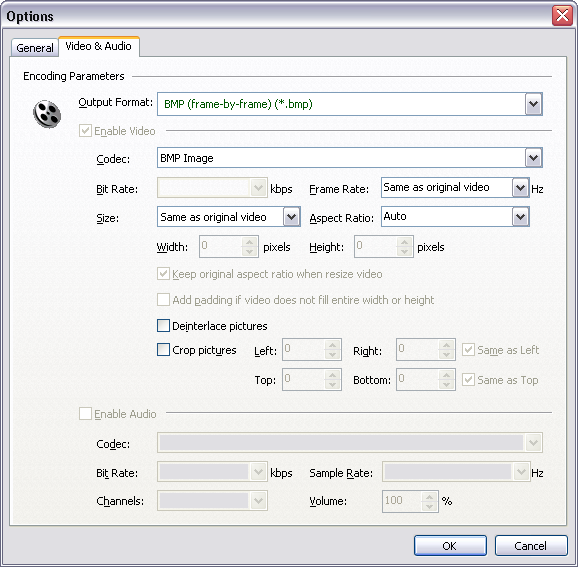
And then, switch to tab "Video & Audio" and choose "BMP
(image sequence)" at "Output Format", and then set options
for image encoding.
- Convert OGV to BMP
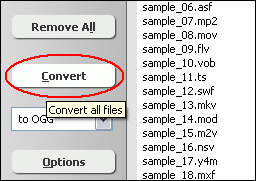
Click "Convert" to convert OGV to BMP sequence.

The software is converting OGV files to BMP.
- View and Browse BMP Files
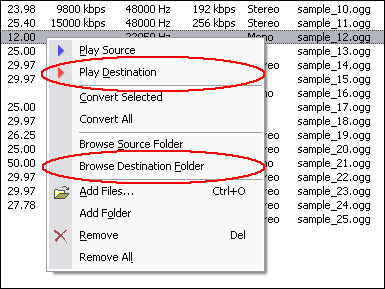
When conversion completes, you can right-click converted item and choose "Play
Destination" to view the first outputted BMP file; or choose "Browse
Destination Folder" to open Windows Explorer to browse the outputted BMP
files.
- Done
Top
OGV to BMP Software is 100% clean and safe to
install. It's certified by major download sites.

Convert OGV to BMP Related Topics:
|












